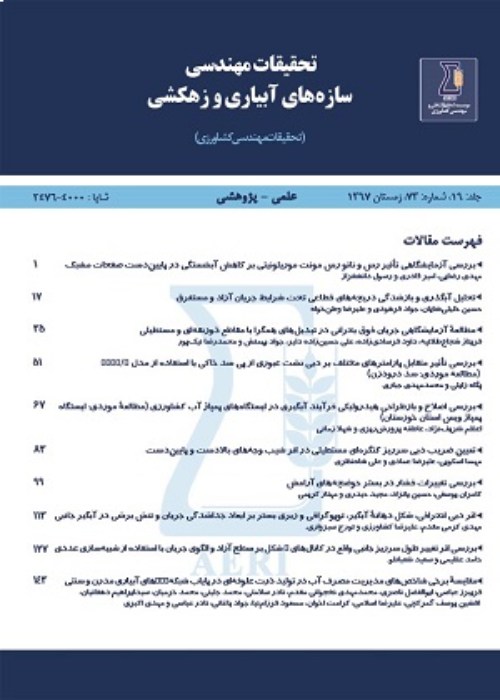Analysis of the privatization of irrigation projects in view point of legislation and policy
Since the 1990 s, a number of countries adopted the transfer policies or irrigation management transfer (IMT), and in some cases, the incentive to reform water laws was provided (Bruns et al., 2005). Making of the investment decisions and water allocation by local and private organizations requires that the water users have confidence in the quantity and time they receive water and this requires the existence of legal transparency. Therefore, water laws should provide a full and indispensable set of rights for use of water (Bayat et al., 2016). In this study, by focusing on the privatization of agricultural water, relevant law clauses were extracted during different periods, and the effectiveness of these rules on management of water resources was analyzed.
In this study, the purpose of “law” is all ratification of parliament, official codes, and administrative regulations. Since land containing groundwater resources are usually governed by private management, the focus is on the rules associated with irrigation networks with surface water resources. To implement the study all documents related to water laws, approved by various organizations of the country, included the resolutions and bills of the Islamic Parliament of Iran, national development plans, the resolutions of the Supreme Council for Water, the efforts of the relevant Ministries, and published procedures and executive regulations. Then the material related to the issue of privatizing and reducing the government’s leadership and authority, or common and applicable laws that lacked relevance to privatization issues were extracted from them and, besides international documents in this regard, were analyzed in a descriptive way.
Until 1929, water governance issues were solved by the common rule of society in the ownership of wells and qanats. Then, by compiling civil code, water governance was enforced using this law. In 1944, with the approval of the law allowing the establishment of the irrigation agency, the individual aspect of irrigation was limited to traditional water rights and the government supervised all irrigation affairs. In this period, for the first time, public and private institutions were allowed to build and invest in irrigation networks. By approving the establishment of companies to exploit lands downstream of the dams, the exploitation of command area of irrigation networks was given to natural persons and non-governmental individuals. After the Islamic revolution, according to the constitution and the approval of the cabinet of ministers, the government was obliged to dispose of its shares in the operation of irrigation networks by maintaining state ownership of the infrastructure. Nevertheless, the devolution of these private companies only occurred in the ownership of the shares and these companies are still dominated by the government in management, structure and the way of referral. The development plans of the country and the approvals of the supreme council of water have stressed the acceleration of the privatization process and the reduction of government incumbency in water projects, but financial support and the executive program have not been taken into account to meet their goals. The set of criteria for operation and maintenance of irrigation networks was notified to the ministry of power in 2005. However, except for identifying the competence of companies, other parts of it could not be implemented, so it is needed to update these instructions. In the study of international experiences of water reform with the approach of privatization in developed (United States and France) and developing countries (Chile, Mexico, Turkey and India), some cases such as clear and transparent water rights with guarantee the implementation of the rules, financial independence of water custodian, appropriate water pricing, establishing a legal framework for privatization process and conducting regular assessments to evaluate the results of transfer of management is considered as the most important measures in water privatization.
Conclusions
By changing the policy of government from centralization to the participation of the private sector and the stakeholders, the current laws in the field of water resources need to be reviewed. Due to the importance of the subject, in this research, we proceed to aggregation rules and procedures related to this discussion and review the consequences of implementing laws and policies of privatization in irrigation networks. The results showed that although there are laws and regulations to attract private sector capital, the time of implementation of water plans and low investment profits has prevented the private sector investment in this sector. The generality of laws, disregard for restrictions, climatic conditions and political changes in the country (such as change of government), has made the implementation of water development programs less effective. In addition, attracting the full political support at high levels of management and legislation of the country, and the use of simple legal framework with accordance of the capacity of water users, were the main factors in success of pioneer countries in water privatization.
- حق عضویت دریافتی صرف حمایت از نشریات عضو و نگهداری، تکمیل و توسعه مگیران میشود.
- پرداخت حق اشتراک و دانلود مقالات اجازه بازنشر آن در سایر رسانههای چاپی و دیجیتال را به کاربر نمیدهد.



